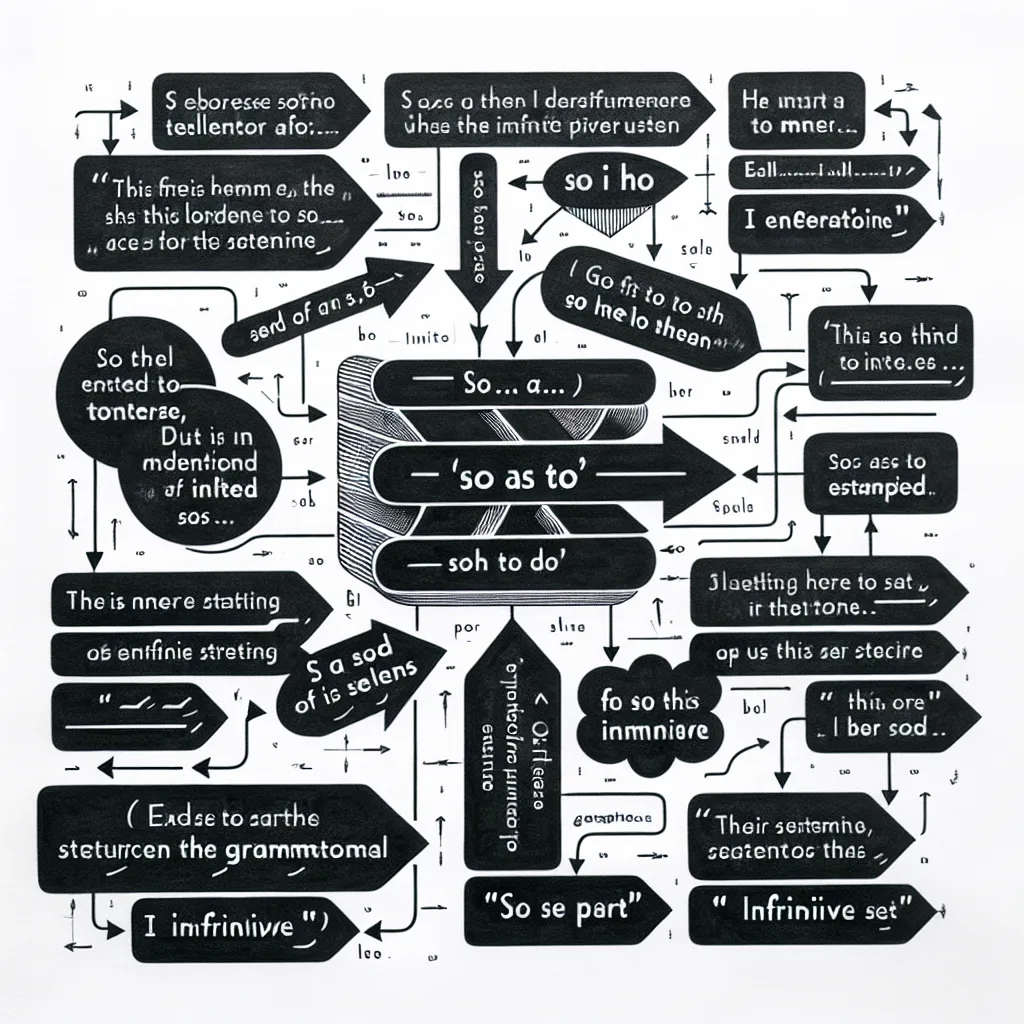The “so… as to” + infinitive structure is a sophisticated grammatical pattern that can significantly enhance your IELTS score when used correctly. This construction is particularly useful in the Writing and Speaking sections of the test, allowing you to express purpose or result with elegance and precision. Let’s delve into the intricacies of this structure and explore how you can leverage it to boost your IELTS performance.
Understanding the “So… As to” + Infinitive Structure
The “so… as to” + infinitive construction is used to express purpose or result in a more formal and sophisticated manner than simple ‘to + infinitive’ phrases. It’s often encountered in academic texts and formal writing, making it particularly relevant for IELTS candidates aiming for higher band scores.
Formula and Grammatical Analysis
Formula: [Subject] + [Verb] + so + [Adjective/Adverb] + as to + [Infinitive]
This structure emphasizes the degree or extent of an action or state, linking it directly to its purpose or consequence.
Examples:
- The lecture was so interesting as to captivate the entire audience.
- The experiment was conducted so carefully as to eliminate any possibility of error.
- She spoke so softly as to be barely audible in the large conference hall.
- The evidence was so compelling as to convince even the most skeptical jurors.
- The storm grew so intense as to force the evacuation of coastal areas.

Applying “So… As to” in IELTS Writing
Task 2 Essay Writing
Incorporating the “so… as to” structure in your IELTS Writing Task 2 essays can demonstrate a high level of language proficiency. Here’s an example paragraph using this structure:
“Environmental pollution has become so severe as to threaten the very existence of many species. Governments worldwide are implementing policies so stringent as to discourage industrial activities that contribute to environmental degradation. However, these measures are often so drastic as to impede economic growth, creating a delicate balance between environmental protection and economic development.”
Analysis:
- “so severe as to threaten” emphasizes the extreme nature of pollution and its consequential threat to species.
- “so stringent as to discourage” highlights the intensity of government policies and their intended effect.
- “so drastic as to impede” underscores the unintended consequence of these policies on economic growth.
Task 1 Report Writing
While less common in Task 1, the “so… as to” structure can still be used effectively in data interpretation:
“The graph shows that carbon emissions in Country X rose so rapidly as to double within just five years. This trend was so alarming as to prompt immediate governmental action.”
Enhancing IELTS Speaking with “So… As to”
Incorporating this structure in your IELTS Speaking responses can showcase your advanced language skills:
Examiner: “Describe a time when you had to make an important decision.”
Candidate: “I recall a situation where I had to choose between two job offers. The decision was so crucial as to potentially shape my entire career path. I deliberated so thoroughly as to consider every aspect of both positions. Ultimately, I chose the role that aligned more closely with my long-term goals, a decision that proved so beneficial as to accelerate my professional growth significantly.”
Comparing Usage for Different IELTS Band Scores
Band 6-6.5:
“The city was very crowded, so I decided to leave early.”
Band 7-7.5:
“The city was so crowded as to make navigation difficult, prompting me to leave earlier than planned.”
Band 8-9:
“The urban congestion had grown so intense as to render navigation virtually impossible, compelling me to depart well in advance of my intended schedule.”
The progression demonstrates increasing complexity and precision in language use, hallmarks of higher band scores.
Common Errors and How to Avoid Them
-
Incorrect word order:
- Incorrect: “The music was so as loud to hurt my ears.”
- Correct: “The music was so loud as to hurt my ears.”
-
Omitting ‘as’:
- Incorrect: “The problem was so complex to solve quickly.”
- Correct: “The problem was so complex as to be unsolvable quickly.”
-
Using ‘that’ instead of ‘as’:
- Incorrect: “The situation was so dire that to require immediate action.”
- Correct: “The situation was so dire as to require immediate action.”
-
Incorrect verb form after ‘to’:
- Incorrect: “The movie was so boring as to falling asleep.”
- Correct: “The movie was so boring as to make me fall asleep.”
-
Overuse or inappropriate context:
- Awkward: “I was so hungry as to eat a sandwich.”
- Better: “I was so ravenous as to devour an entire feast.”
Conclusion
Mastering the “so… as to” + infinitive structure can significantly enhance your IELTS performance, particularly in Writing and Speaking tasks. This sophisticated construction allows you to express purpose and result with precision and elegance, characteristics highly valued in academic and professional English. Practice incorporating this structure into your language use, being mindful of common errors, and you’ll be well on your way to achieving a higher band score in your IELTS exam.
Remember to use this structure judiciously and in appropriate contexts. Overuse can make your language sound unnatural, so balance it with other complex structures and varied vocabulary. With consistent practice and attention to detail, you’ll find that the “so… as to” construction becomes a valuable tool in your IELTS preparation arsenal.